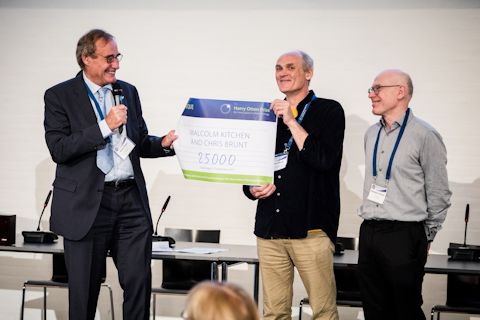Harry Otten Prize for Innovation in Meteorology awarded in Copenhagen
The Harry Otten Prize for Innovation in Meteorology has been awarded for the fourth time. During the Annual Meeting of the European Meteorological Society currently taking place in Copenhagen, Denmark, the jury announced that Malcolm Kitchen from the UK Met Office and Chris Brunt from the University of Exeter, have won the first prize of 25’000 Euro. Their idea, A New Method of Measuring Atmospheric Refractivity, is to obtain information of the atmosphere by measuring the bending of radio signals broadcast by commercial aircraft. The method generates important information on the humidity all the way from the airplane to the measuring instrument. Knowing the moisture distribution in the atmosphere is very important for computer calculations of the weather. Shower prediction, for instance, could be improved with their method. They demonstrated the viability of the idea using a preliminary setup in southwest England.
The winners of the prize were selected from three finalists. The other two finalists received 2’500 Euros for their ideas.
Yann Dufournet, Igor Stepanov, and Geanny Amos dos Santos from SkyEcho in The Netherlands presented their innovative idea called enLIGHT – A new way to communicate high definition weather data about the incoming weather hazards to citizens. They propose to use high resolution weather radar and nowcasting to warn urban residents about hazardous weather on very short timescales. They demonstrated their idea for the city of Rotterdam.
Paul Petersik from Germany discussed his idea called VineForecast – A tool to generate individual predictions of vine diseases and phenology. The goal is to predict the risk of outbreaks of mildew in vineyards using high resolution model output, local observations, and machine learning algorithms. This would provide vineyard owners with timely warnings of possible disease outbreaks thus preventing overuse of fungicides.
The jury received applications for the prize from different European countries, Russia, and the USA. Leo Kroon, Chairman of the Board of the Harry Otten Foundation, commented, “The idea put forward by Malcolm Kitchen and Chris Brunt is highly innovative. It enables the observation of humidity in the lowest layers of the atmosphere, thereby potentially improving weather forecasts, especially for regional applications.”

At the EMS 2019 in Copenhagen Harry Otten presents the prize to Chris Brunt (centre) and Malcolm Kitchen (right). Photo: Thorsten Iversen.
